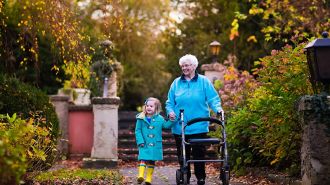- Our studies
- Our research
- Publications and resources
- Data access and training
- About
- News
- Events
- Get in touch
- Join our mailing list
Welcome to our news and blogs section. Here you’ll find the latest developments and insights from across our longitudinal studies.
Growing Up in Digital Europe (GUIDE) is the UK pilot of a major European initiative to create internationally harmonised data for research on child development and wellbeing.

The latest version of the National Child Development Study: Partnership Histories (1974-2013) has been released at the UK Data Service.
CLOSER’S 2017 conference on inequalities was an opportunity to share ideas and innovations with longitudinal researchers from across disciplines and sectors, both from the UK and abroad.

Researchers have failed to find a causal link between children’s development and their relationships with their grandparents.

Support for children with emotional and behavioural problems may be more effective if targeted at those with both cognitive difficulties and depressed mothers, new findings suggest.

What can cohort studies show us about gender equality? Founding Director of MCS and Emeritus Professor of Economic and Developmental Demography, Heather Joshi explains in an IOE London blogpost.

Children born to older mothers tend to show the most cognitive ability nowadays, when in previous generations they typically showed less promise.

Parents’ home ownership is becoming a more important determinant of their children entering the housing market, according to new research.

Young adults from working class homes are more likely to drink heavily if they smoked during their teenage years, whereas their middle class peers start drinking excessively if they go on to higher education.

Women who have never given birth or been pregnant have double the odds of reaching the menopause before the age of 40, compared to those who have been pregnant.

How has the Millennium Cohort Study (MCS) aided government understanding of the social inequalities faced by young people today?

The negative effect of low birth weight on cognitive ability has decreased dramatically for children born at the turn of the millennium, compared to the Baby Boomers and Generation X before them.

People who take part in community activities are more likely to have better memory and problem-solving skills in later middle age, according to new findings from the National Child Development Study (NCDS).
Ryan Bradshaw
Senior Communications Officer
Phone: 020 7612 6516
Email: r.bradshaw@ucl.ac.uk